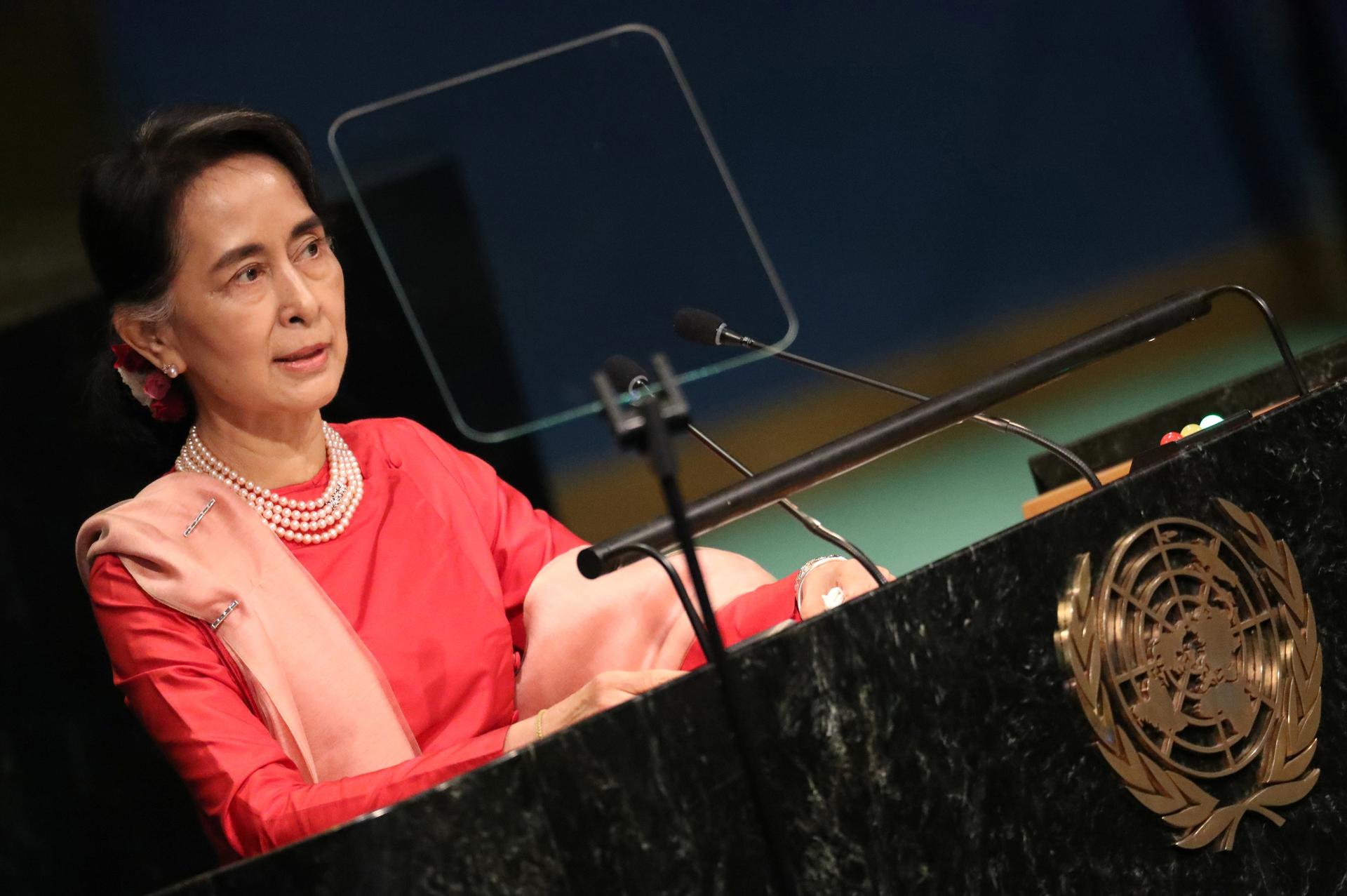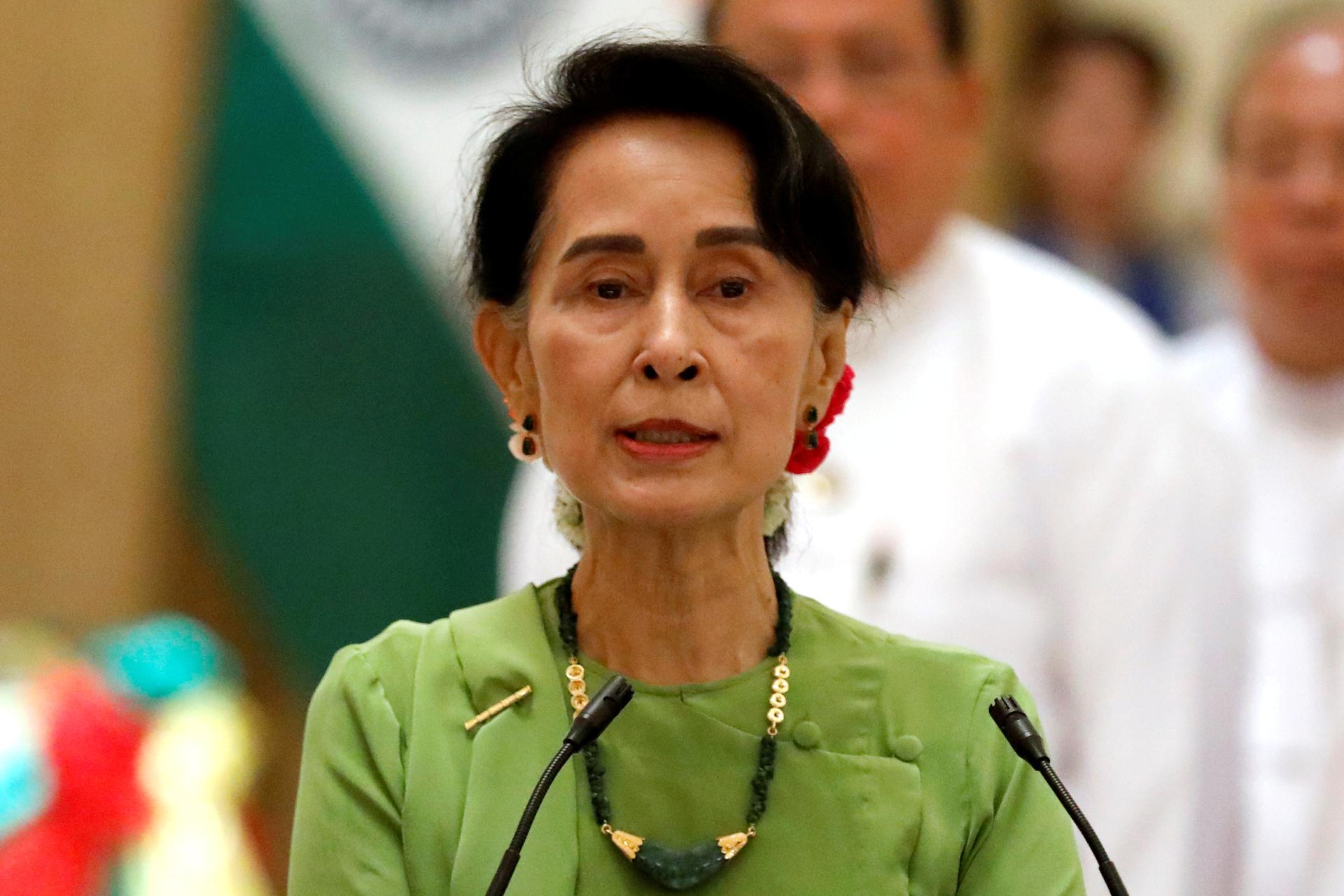Myanmar’s Aung San Suu Kyi to miss UN trip amid Rohingya crisis
Aung San Suu Kyi speaking at a news conference in Myanmar.
In the face of a barrage of criticism over her failure to speak up for Rohingya Muslims, Myanmar leader Aung San Suu Kyi will not attend the United Nations General Assembly.
A crackdown by Myanmar's army, launched in response to Rohingya militant attacks on August 25, has sent some 379,000 Rohingya refugees scrambling across the border to Bangladesh in less than three weeks.
The violence has incubated a humanitarian crisis on both sides of the border and piled intense global pressure on Suu Kyi to condemn the army campaign, which the UN has described as having all the hallmarks of "ethnic cleansing."
Related: Myanmar’s gruesome purge of Rohingya Muslims appears unstoppable
Bangladesh is struggling to provide relief for exhausted and hungry refugees — some 60 percent of whom are children — while nearly 30,000 ethnic Rakhine Buddhists as well as Hindus have been displaced inside Myanmar.
Nine thousand more Rohingya refugees poured into Bangladesh on Wednesday, the UN said, as authorities worked to build a new camp for tens of thousands of arrivals who have no shelter.
Suu Kyi, Myanmar's first civilian leader in decades, has no control over the powerful military, which ran the country for 50 years before allowing free elections in 2015.
There is also scant sympathy among Myanmar's Buddhist majority for the Rohingya, a stateless Muslim group branded "Bengalis" — shorthand for illegal immigrants.
But outside of her country Suu Kyi's reputation as a defender of the oppressed is in ruins over the Rohingya crisis.
Rights groups have pilloried the former democracy activist for failing to speak out against the army campaign, which has left hundreds dead.
Rohingya refugees have told chilling accounts of soldiers firing on civilians and razing entire villages in northern Rakhine state with the help of Buddhist mobs.
The army denies the allegations, while Suu Kyi has also played down claims of atrocities, instead blaming "a huge iceberg of misinformation" for complicating the conflict.
Listen: Aung San Suu Kyi's silence on Rohingya ethnic cleansing could be political pragmatism
The UN Security Council was scheduled Wednesday to discuss the refugee crisis in a closed-door meeting, with China expected to shoot down any efforts to censure its strategically pivotal Southeast Asian ally.
"The state counsellor won't attend the meeting of the United Nations General Assembly," government spokesman Zaw Htay told AFP, adding that the vice president would go in her place.
He did not comment further but told local media that Suu Kyi was staying in Myanmar to focus on domestic issues.
Fallen star
Suu Kyi, a Nobel Peace Prize winner garlanded for her dignified and defiant democracy activism under Myanmar's former junta, was once the darling of the international community.

She made her debut before the UN assembly last September, winning warm applause for a speech delivered months after she became Myanmar's first civilian leader following a decades-long democracy struggle under the former junta.
In it she vowed to find a solution to long-running ethnic and religious hatred in Rakhine "that will lead to peace, stability and development for all communities within the state."
In a sign of how far Suu Kyi's star has fallen since, the same rights groups that campaigned for her release from house arrest have blasted her for failing to speak up in defense of the Rohingya.
Sympathizers say her hands are tied by the army, which still runs a chunk of the government and has complete control over all security matters.
But fellow Nobel laureates have lined up to condemn her silence, with Archbishop Desmond Tutu calling it "incongruous for a symbol of righteousness to lead such a country."
While the US and other Western powers have criticized the military campaign, Beijing on Tuesday offered Myanmar support saying the country was entitled to "safeguard" its stability.
Human Rights Watch's Phil Robertson urged the council to pass a "global arms embargo" on Myanmar's military, but said he expected China to to water down any reaction.
The 1.1-million strong Rohingya have suffered years of discrimination in Myanmar, where they were stripped of their citizenship despite having long roots in the country.
Bangladesh does not want the group either, though it is providing the refugees with temporary shelter.
Many Rohingya died making the perilous journey across the border, with nearly 100 drowning in boat trips across the Naf river that divides the two countries.
Bangladeshi authorities want to establish a 2,000-acre camp close to Myanmar's border to house around 250,000 Rohingya and are also planning to build facilities on a flood-prone island.
The story you just read is accessible and free to all because thousands of listeners and readers contribute to our nonprofit newsroom. We go deep to bring you the human-centered international reporting that you know you can trust. To do this work and to do it well, we rely on the support of our listeners. If you appreciated our coverage this year, if there was a story that made you pause or a song that moved you, would you consider making a gift to sustain our work through 2024 and beyond?
